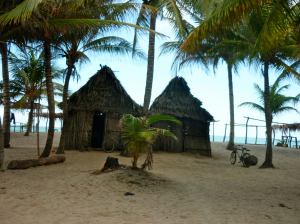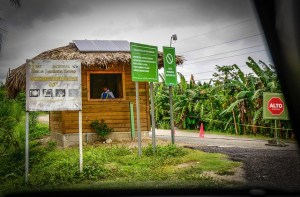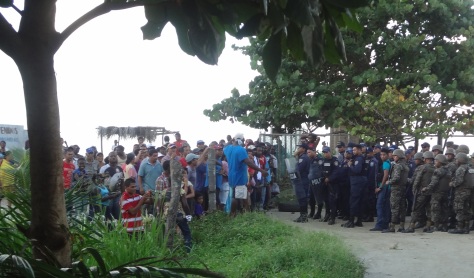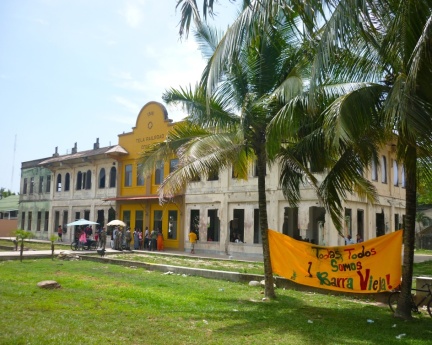From May 12 to 14, PROAH accompanied the Garífuna community of Barra Vieja in Tela, where 66 members of the community appeared in court for a public hearing, accused of “usurpation of lands in detriment to the State”.
The Garífuna community of Barra Vieja, located in the municipality of Tela, like many other Garífuna communities on the northern coast Honduras, faces the threat of forced eviction from their ancestral lands by private economic interests and the State of Honduras. Ever since residents became aware of the plan to install a luxury hotel complex in their community, the struggle for recognition of their ancestral land rights and the defense of Garífuna culture intensified. The community has suffered two eviction attempts and legal complaints against them for land usurpation resulted in the entire community being summoned to court from May 12-14th, 2015.
Indura Beach & Golf Resort, a tourist project promoted by big business and the State of Honduras
The construction of the Indura Beach Resort complex began in 2006, taking several acres of community land. The hotel was inaugurated in November 2013, but further expansion of the project is planned. Today, the gated entrance to the resort is located next to the Barra Vieja community. The hotel fence, borders the access route to Barra Vieja (see photo).
The Tela Bay Toursim Development company (Desarrollo Turístico Bahía de Tela-DTBT), owner of the Project, is a prívate-public Enterprise with 49% of its financing from the Honduran Institute of Tourism (Instituto Hondureño de Turismo – IHT) and 51% from the Honduran Fund for Tourism Investment (Fondo Hondureño de Inversión Turística – FHIT), comprised of some of the most powerful businessmen in Honduras (1).
The legal fight for land and criminalization of land rights defenders
In 2007 the Honduran Institute of Tourism, through the National Port Authority (ENP), filed a complaint with the Public Prosecutor in Tela against the residents of Barra Vieja for usurpation of State lands and declaring itself owner of this territory. According to OFRANEH (Black Fraternal Organization of Honduras), the ENP “mysteriously became the owner of a good portion of Garífuna territory in the Bay of Tela”. Since then, the community began a legal battle for recognition of its right to live on ancestral lands, confronting powerful private and State investment interests.
The criminalization began in July 2013 when several members of the community were captured and detained by the police for several hours. Since that date, almost all of the adult members of the community have been issued alternative measures to prison, accused of usurpation, which require them to sign before a judge each week and prohibits them from leaving the country.
One year later, the community of Barra Vieja suffered two evictions: on September 6 and 30th, 2014. In both instances, the armed forces removed all of the personal belongings of 150 families from their homes. The population peacefully resisted the eviction and returned the same day to their community. The community of Barra Vieja has denounced the psychological impact of these evictions on the population, in particular on the children who are strongly impacted by the heavy police and military presence which PROAH observed during an eviction attempt on the 29th of September, 2014:
Oral and public hearing:
On April 12 – 14th 2015, 66 members of the community were summoned to appear before the court in Tela, accused of usurpation in detriment to the State. Due to lack of space in the Tela courtroom, the proceedings took place in the old installations of the Tela Railroad Company, a subsidiary of the United Fruit Company, which since the 1930s has promoted the removal of Garifuna communities for banana plantations.
During the three days of proceedings, nearly 400 people from different Garifuna communities accompanied the people of Barra Vieja in solidarity. Of note, only 66 people from the community were summoned; the majority of the community leaders and over 40 other people from the community were not summoned although they continue to be processed and under alternative measures to prison. The prosecution was represented by the Public Ministry, the Attorney General’s Office and the National Port Authority.
After three days of proceedings, the judge accepted a request from the prosecution to postpone the hearing so that they could have time to find their witnesses who had not appeared for the hearing so that they could testify at the next hearing which was set for June 3, 2015.
INTERNATIONAL HUMAN RIGHTS LAW vs TRANSNATIONAL CORPORATE INTERESTS
According to OFRANEH, “The case of Barra Vieja is a violation of ILO Convention 169 on indigenous and tribal peoples” which is ratified by the State of Honduras. For OFRANEH, the pressure on Barra Vieja is part of a Honduran government strategy to remove Garífunas from their lands in order to exploit their territories; it represents a danger to their right to land, prior consultation and places their survival and culture at risk.
The pressure of indigenous lands in Honduras intensified in 2013 with the passage of the Law for Employment and Economic Development Zones (ZEDEs – model cities) which includes over 20 Garifuna communities impacted by several of these ZEDEs which are to be concessioned to foreign investors with the objective of creating zones which are independent of state institutions and in which the justice system is outsourced.(2)
The IACHR calls on the government of Honduras to respect the rights of the Garifuna people
In the preliminary report on its in situ visit to Honduras in December 2014, the Inter American Commission on Human Rights called on the government to: 1) “recognize the cultural identity of the Garífuna” people and 2) “intensify its actions to respect and guarantee their lands, adopt the necessary measures for completing the obligation of the state to guarantee prior, free and informed consultation regarding projects developed in their lands, territories and that impact their natural resources, taking into consideration the special relationship between these peoples, the land and natural resources.”
In light of the heavy pressure and economic interests at play in the case of Barra Vieja and depending on the decision of the court in June, the community may have to appeal to the Inter American Court of Human Rights which has developed a body of jurisprudence reaffirming the right of indigenous peoples to ancestral territories.
Update – June 10, 2015:
On June 4, 2015 the Court in Tela aquitted 66 Garifuna members from the community of Barra Vieja who were charged with land usurpation. However, a trial against eight leaders of the Barra Veija community continues. They face a new hearing on June 30th. For more information, see this article by OFRANEH (in Spanish) and the Interview of Miriam Miranda, OFRANEH coordinator: http://t.co/O9Y8wLxjof
1. In February 2015, the First Encounter of the Alliance for Prosperity for the Northern Triangle was held at this resort, with the presence of the Presidents of Honduras, Guatemala, El Salvador, and CEAL. The official purpose of the event: secure private sector backing for the Alliance for Prosperity Plan for the Northern Triangle. A group of civil society organizations from Central America and the United States expressed grave concerns regarding the Alliance in a public letter directed to the heads of State of these countries. In particular, their concern “is based on the fact that the Plan reinforces the same economic policies that have resulted in inequality, detonated generalized violations of labor rights, an increase in violence targeting labor leaders and the forced displacement of the population throughout Meso America.”






